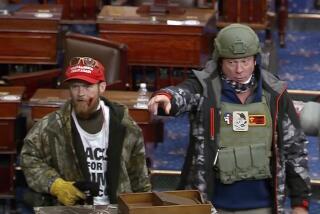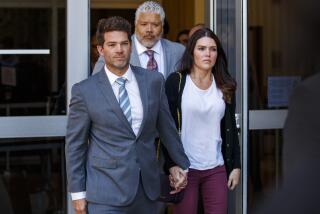Judge rules Army interfered improperly in sexual assault case
FT. BRAGG, N.C. — The Army improperly interfered with the decision to reject Brig. Gen. Jeffrey A. Sinclair’s offer to plead guilty to lesser charges in his sexual assault case, a military judge ruled Monday.
Col. James L. Pohl said there was evidence that Army officials had exerted “unlawful command influence” when a three-star general turned down Sinclair’s offer before the trial. The judge gave defense attorneys the option of renewing Sinclair’s original plea offer or making a different one; in any case, he said, the case must be overseen by a new command authority. But Pohl refused to dismiss the charges, which include sexual assault and sodomy.
The evidence cited Monday did not come to light until after Sinclair’s accuser, an Army captain, tearfully testified Friday that Sinclair sexually assaulted her and threatened to kill her and her family if she disclosed their three-year affair.
Defense attorneys learned of the evidence Saturday night, when prosecutors turned over emails from Army lawyers and the three-star general.
“What we have here is a wrong,” Pohl told prosecutors.
If Sinclair’s defense offers a new plea, the judge said, a new senior commander would be appointed to review it, and the case would be delayed. If not, he said, Sinclair’s court-martial on sexual assault charges and other offenses would proceed. He told the defense to decide by Tuesday morning.
Sinclair’s lead lawyer, Richard Scheff, called the ruling “a major win for us.”
The revelations threw into turmoil a case that has coincided with intense political and public scrutiny of the way the military responds to allegations of sexual abuse in the ranks. In swiftly removing Sinclair from command and bringing charges after the accuser came forward in 2012, the Army hoped to show that it was cracking down on sex offenders.
The defense has accused the Army of trumping up the charges in response to political pressure to take strong action against a surge of sexual assaults. Now it has a new opportunity to negotiate a plea deal that could eliminate the most serious charges.
In finding evidence of “unlawful command influence,” the judge chastised Army prosecutors for waiting until after the court-martial had begun to turn over the emails.
“We’re in a rather unusual place,” the judge said, referring to litigating pretrial issues in the middle of a court-martial.
Scheff asked the judge to dismiss the sexual assault charges, saying, “This process has been tainted.”
Pohl declined.
The judge lashed out at Army prosecutors, asking, “Do we have to wait two months in the middle of the trial before we get these [emails]?”
“When does it end?” Pohl asked the lead government prosecutor, his voice rising. “You dribble discovery to the defense. ... We have hearing after hearing ... and then a little more comes out.”
Sinclair, 51, former deputy commander of U.S. troops in southern Afghanistan, pleaded guilty last week to adultery, inappropriate relationships with two other female officers, attempting an inappropriate relationship with a third, impeding an investigation and viewing pornography while on duty. That was a tactical move by the defense to avoid salacious accounts of philandering and pornography, and to focus on attacking the accuser’s credibility.
Scheff said Sinclair, who faces up to 15 years in prison for the offenses to which he has pleaded guilty, has the option of withdrawing those pleas.
The general remains charged with sexual assault, sodomy, groping the captain against her will, “open and notorious” sex, and abusing his government credit card in pursuit of trysts with the captain. If convicted on all charges, he faces life in prison.
A Ft. Bragg spokeswoman, citing the virtually unprecedented courtroom events, said Army military lawyers were working late Monday on answers to questions about how a new command authority would be selected. She said they were also looking into the status of the jury panel of five male two-star generals, who were not present for courtroom discussions Monday.
At issue in Monday’s hearing was a letter to Lt. Gen. Joseph Anderson, the officer who would decide whether to accept Sinclair’s plea offer. In it, a special victim’s advocate, Capt. Cassie Fowler, mentioned political risks associated with accepting Sinclair’s plea: Doing so “would have an adverse effect on my client and the Army’s fight against sexual assault,” she wrote.
Fowler mentioned the political tussle in Congress over removing commanders’ authority to decide whether to pursue sexual assault charges. A bill that would have done that fell short in the Senate last week, but a weaker measure passed Monday and now goes to the House.
The defense had cited Fowler’s letter in a motion last week to dismiss all charges. The judge refused but called the letter’s language “inappropriate.”
Then at 6:05 p.m. Saturday, prosecutors began sending the defense 14 pages of Army emails the team had been requesting for weeks.
Some emails showed that top Army lawyers not only discussed Fowler’s letter, but that Anderson’s military legal advisor indicated in a Dec. 18 email that he had discussed the plea offer with Anderson — and that the letter had “made [it] an easy decision” to reject the plea.
In a Dec. 20 email, Anderson wrote: “I have read the letter and made my decision” to reject Sinclair’s offer.
But in testimony Monday from Afghanistan, Anderson said he did not entirely recall reading the letter.
“I saw it but did not read it word for word,” he testified.
Anderson said he wasn’t interested in the advocate’s position but in the accuser’s, and rejected the plea because she opposed it.
Pohl asked whether he had received any political pressure from officials in the Army or in Washington. “Not at all,” Anderson replied.
But the judge ruled the evidence showed Anderson had read Fowler’s letter, raising the possibility of unlawful command influence.
The crucial portion of Anderson’s testimony “does not seem to make any sense,” and is contradicted by the three-star general’s own email from December, Pohl said.
Saturday’s trove of emails also showed concern among Army officials about the accuser’s truthfulness, in addition to similar concerns voiced by the lead prosecutor before he quit the case last month after failing to persuade the Army to drop the most serious charges.
The accuser testified in a Jan. 7 preliminary hearing about a cellphone she said she found while unpacking boxes Dec. 9, long after evidence was supposed to be turned over. Forensic analysis indicated that she lied about when she found it and what she did with it. The phone contains messages to and from Sinclair.
Col. Michael Lacey, a senior military lawyer at Ft. Bragg, wrote to Anderson the next day: “It is possible that she was not truthful.”
“The forensic analysis of the phone indicates she accessed the phone before 9 December, which brings her credibility into question,” Lacey told Anderson.
An email from another high-ranking Ft. Bragg legal officer, written after the accuser disclosed finding the phone, appears to suggest that the Army accept Sinclair’s offer to plead guilty to lesser charges.
“For my part it’s 90% there,” Lt. Col. James Bagwell, chief of military justice at Ft. Bragg, wrote of the offer in a Dec. 16 email to a senior Army legal officer at the Pentagon, Brig. Gen. Paul Wilson, then a colonel.
Bagwell said a lot was happening in the case, “virtually none of it good for Govt.” He asked Wilson for his thoughts on the plea offer. There was no return email from Wilson among those turned over to the defense.
On the witness stand Monday, Bagwell said he contacted Wilson without the knowledge of other senior legal officers at Ft. Bragg because Wilson was his mentor and had served on the legal staff at Ft. Bragg.
Bagwell said Wilson did not offer any advice on how the Army should respond to Sinclair’s plea offer: “Absolutely not, in any way, shape or form.” He said Wilson responded in a phone call that touched only briefly on the Sinclair case.
Under Scheff’s cross-examination, Bagwell said he considered Sinclair’s plea offer “reasonable” and “feasible,” and believed it was 90% on the way to approval.
But when questioned by the judge, Bagwell said the plea offer was “off the table” after Army lawyers conferred with the accuser.
Scheff complained to the judge that prosecutors had accused him of embarking on “a fishing expedition” in seeking Army emails.
“Every time, we catch fish,” Scheff said, referring to the Saturday emails and previous evidence eventually provided by prosecutors.
Outside court, Scheff said the judge’s ruling validated concerns raised by Lt. Col. William Helixon, the lead prosecutor who left the case in February. Helixon said he had doubts about the accuser’s credibility and tried to persuade the Army to drop the most serious charges.
Scheff called the case “a mess ... a mess created by the government.”
More to Read
Start your day right
Sign up for Essential California for news, features and recommendations from the L.A. Times and beyond in your inbox six days a week.
You may occasionally receive promotional content from the Los Angeles Times.







